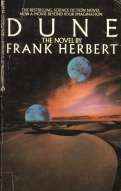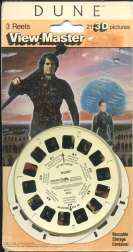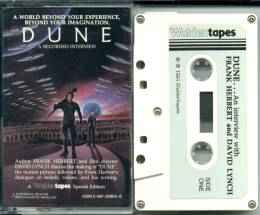|
Dune
Without reading earlier drafts, Lynch went to work on a screenplay capable of satisfying his vision. "The most difficult aspect of course, was being true to the whole," he remarked in Prevue magazine. "I couldn't reduce it to the point where the story's essence is lost—millions of fans would feel raped!" The four-year production expanded to include Sting, Kyle Maclachlan, Patrick Stewart, Alicia Witt, Max von Sydow, Dean Stockwell, Sean Young, Jack Nance, and an uncredited cameo by Lynch as a Spice worker. After reviewing the finished project, Lynch was so horrified by his efforts that he lobbied to have his name removed from the credits altogether. The actors and actresses appeared embarrassed just standing there, and numerous elements of the film dripped with unintentional homoeroticism worthy of The Ambiguously Gay Duo. Production assistants quietly wondered amongst themselves if they weren't just collaborating to manufacture more of Frank Herbert's Dung.
September, 1983: "I met David and I loved him. He's a madman in sheep's clothing, and I just felt I had to do the movie because I know he's going to do something extraordinary." July 1985: "I didn't even like the film, I don't have a clue what it was about, it was very confusing." November 1987: "I refuse to take responsibility for any film I'm in. It's the directors movie." May, 1998: "There's no actor who's been in nothing but great movies, nothing but successes. You can make a few lousy movies in relative obscurity."
"I started selling out on Dune," Lynch recalls. "Looking back, it's no one's fault but my own. I probably shouldn't have done that picture, but I saw tons and tons of possibilities for things I loved, and this was the structure to do them in. there was so much room to create a world. But I got strong indications from Dino De Laurentiis of what kind of film they expected, and I knew I didn't have final cut. And little by little—and this is the danger, because it doesn't happen in chunks, it happens in the tiniest little shavings, little sandings—little by little every decision was always made with them in mind and their sort of film. Things I felt I could get away with within their framework. So it was destined to be a failure, to me."
"In retrospect," laments Lynch, "I can see that I started getting into trouble with Dune early on, and it wasn't just the final editing that did it, although I think the film could be way, way of better. I still worry that I don't know if it could ever be a great film, or even a real good film. I don't know. I forget so much about it." |

 In 1984, director David Lynch turned down an opportunity to direct Return
of the Jedi in favor of teaming up with wanna-be-bankrupt Dino DeLaurentiis
productions for a movie version of Frank Herbert's sprawling epic Dune,
first published in 1965. The story is a melodramatic mish-mash of all the
most commonly hacked-out space opera fantasies ever explored by human beings:
political statements, environmental issues, romantic and religious themes. An
empire millennia in the year 10,191. An oppressed people. A commodity of vast
value and importance. A noble family. A hyperactive, nefarious villain bordering
on the ridiculous, a jihad on a galactic scale, and phallo-centric
creatures of the desert euphemistically referred to as Sand Worms.
In 1984, director David Lynch turned down an opportunity to direct Return
of the Jedi in favor of teaming up with wanna-be-bankrupt Dino DeLaurentiis
productions for a movie version of Frank Herbert's sprawling epic Dune,
first published in 1965. The story is a melodramatic mish-mash of all the
most commonly hacked-out space opera fantasies ever explored by human beings:
political statements, environmental issues, romantic and religious themes. An
empire millennia in the year 10,191. An oppressed people. A commodity of vast
value and importance. A noble family. A hyperactive, nefarious villain bordering
on the ridiculous, a jihad on a galactic scale, and phallo-centric
creatures of the desert euphemistically referred to as Sand Worms. Even
Sting's opinion of the film slowly morphed over time as he came to realize Dune
would be inextricably linked to his reputation and career:
Even
Sting's opinion of the film slowly morphed over time as he came to realize Dune
would be inextricably linked to his reputation and career: April,
1998: "I was flicking through the channels in a hotel room in the Midwest.
Suddenly there they were, the flying underpants. They were great but very tricky
to get on under your flares. I still don't actually know what Dune was
about and I don't know if anyone did."
April,
1998: "I was flicking through the channels in a hotel room in the Midwest.
Suddenly there they were, the flying underpants. They were great but very tricky
to get on under your flares. I still don't actually know what Dune was
about and I don't know if anyone did." To
this day, the only people who claim Dune is a great movie are those
who developed a grade-school fondness for the series of novels. Abstract rumors
regularly circulate in excitable chat rooms and sci-fi conventions: have you
heard about the four hour version? The six hour version? What
about the director's "choice cut" ten hour version?
The legacy of Dune includes eight sequels (by Frank Herbert, his son
Brian and other authors), two television miniseries on the SciFi channel, five
computer games, countless Marvel comics, action figures, birthday party plates,
board games, and Viewmaster discs.
To
this day, the only people who claim Dune is a great movie are those
who developed a grade-school fondness for the series of novels. Abstract rumors
regularly circulate in excitable chat rooms and sci-fi conventions: have you
heard about the four hour version? The six hour version? What
about the director's "choice cut" ten hour version?
The legacy of Dune includes eight sequels (by Frank Herbert, his son
Brian and other authors), two television miniseries on the SciFi channel, five
computer games, countless Marvel comics, action figures, birthday party plates,
board games, and Viewmaster discs.